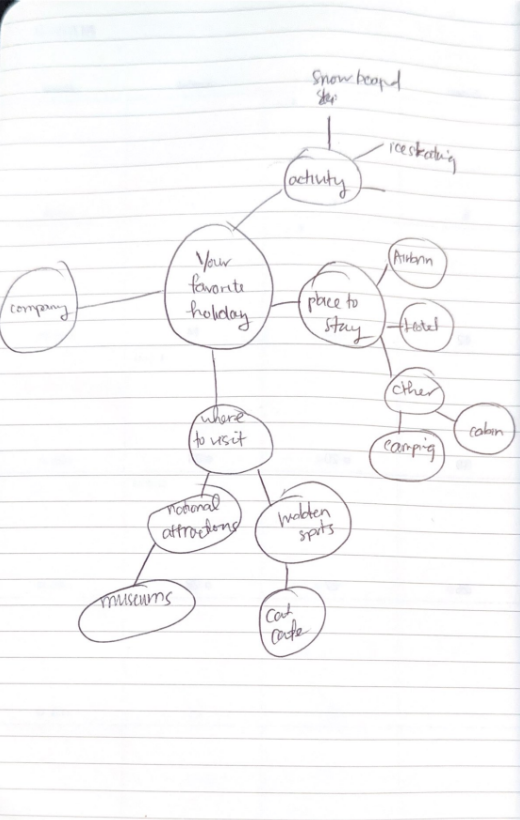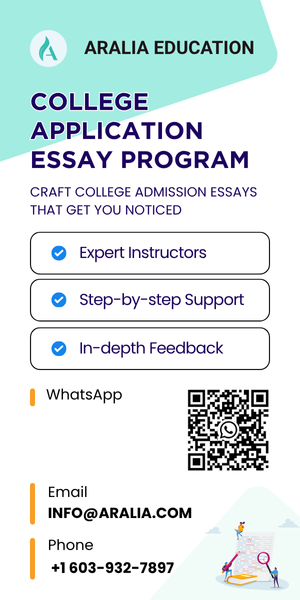1. Generate Ideas
If you are facing writer’s block, such as struggling long period of time to find a topic or angle for your writing competition entry, try brainstorming ideas. Brainstorming is a creative technique that can help you generate a list of potential topics and angles. To get started, set a timer for 10-15 minutes and write down every potential idea that comes to your mind. Don’t worry about whether the ideas are good or bad—write them all down. In this stage, we’re focusing on coming up with as many ideas as possible, rather than the quality, relevance, or viability of those ideas.
Once you have a list of ideas, you can narrow them down and choose one that works best for you. While doing so, remember your audience, or who you are writing for, to tailor your idea accordingly. You can cross off the ideas on paper or put them on Post-its to visualize them better.
After picking one or two potential ideas, you should try free-writing for a few minutes on each topic (this can still be helpful for refining your topic and interests even if you’ve settled on a single idea). Set a five-minute timer and write whatever comes to mind about your topic. Don’t worry about grammar, spelling, or punctuation—just let your thoughts flow freely. This stream of consciousness exercise can help you access your subconscious and explore topics in-depth without the pressure of structure or relevance. Free writing is also extremely helpful for non-native speakers, as they often focus on grammar or accuracy, which leaves less time for content and cohesive argumentation.
If you’re still struggling to come up with ideas, you can also choose to brainstorm using a mind map. Visual learners often find this method to be extremely helpful. Start by writing your main topic in the center of a piece of paper, then draw branches off of it to represent different angles and ideas. You can use colors, images, and symbols to help you visualize your ideas.
How to create a mind map:
- Put the essay question in the middle. The example below asks the student to write about her favorite holiday.
- After putting the question in the middle, think about big sub-topics connected to the main topic.
- Add any ideas coming off the subtopics that support or expand on each subtopic.
After that, you will end up with something like this:

Remember, your initial brainstorming aims to generate as many ideas as possible. You will take the time to refine them later, and no one else has to see your list, so don’t limit yourself. These exercises can be particularly useful for overcoming writer’s block, because their free-form nature will relieve the pressure for quality and perfection off of your shoulders, and allow you to freely tap into your creativity.
2. Setting Goals
Setting realistic goals is an essential part of a writing project, even without the obstacle of writer’s block. However, setting new goals or checking the ones that you have to ensure that they’re realistic and achievable can help you pinpoint any specific issues in your process and give you renewed motivation during the writing process. Writing for a writing competition can be challenging, but setting achievable goals can make it more approachable and manageable. When setting goals, it is essential to be realistic and choose attainable objectives as unrealistic goals can be discouraging and lead to feelings of failure, which can exacerbate writer’s block. It’s also encouraged to break each of your goals down into the steps that it will take to achieve them. This will help you to understand what will really need to go into each one, and how to prioritize each smaller step.
One approach to goal setting is to establish a daily writing routine. By committing to a set amount of time each day to write, you will establish a habit that guarantees consistent progress toward your bigger goals. You can start with a small amount of time, such as fifteen or thirty minutes a day, and gradually increase it as you become more comfortable with the routine. The important thing is to be consistent and integrate writing into your day-to-day life.
Another way to set goals is to focus on the quantity of writing rather than the time you spend on it. You can do this by setting a word count or page count goal for each writing session. For example, you could set a goal to write 500 words daily or complete a chapter by the end of the week. Breaking down your writing into smaller, more manageable pieces can make it feel less daunting. It can also be a good way to track your progress and celebrate your accomplishments.
3. Take Breaks
When you’re struggling to find the right words or ideas for your writing competition entry, stepping away from your work for a little while can help clear your mind and refocus your energy.
Short breaks can be particularly effective when you need a quick reset. Taking a 10-15 minute break can give you enough time to stretch your legs, get some fresh air, or do a quick mindfulness exercise to clear your mind. Choosing a relaxing and enjoyable activity is essential, as this can help reduce stress and anxiety contributing to writer’s block.
As a blog writer, I have faced writer’s block many times before. Listening to music is my favorite way to reset and overcome mental obstacles. Music can be a powerful mood enhancer, helps me access different emotions and feelings, and assists me in putting my headspace in the right context for the writing task. You could listen to calming instrumental music, electronic music, or even upbeat pop depending on your mood and what helps you the most. For me, American pop helps me feel motivated and energetic about writing!
If you have more time, consider taking a longer break to engage in a different creative activity. Doing something unrelated to writing such as drawing, painting, or playing an instrument can help you access a different part of your brain and spark new ideas. These activities can be particularly effective if you feel stuck.
It is also important to keep in mind that taking a break does not mean giving up on your writing. Taking a break can be a powerful way to recommit to your writing, and approach it with renewed energy and focus. When you return to your writing, you may have a new perspective or fresh ideas that can help you overcome writer’s block and move forward on your writing competition entry with confidence.

4. When Facing Writer's Block, Don't Forget to Seek Feedback
If you’re struggling with writer’s block or feeling unmotivated while writing your competition entry, getting feedback from others can be a helpful way to stay on track and improve your work. Whether through a writing group, or from a mentor or teacher, feedback can provide valuable insights and different perspectives on your writing.
One benefit of getting feedback is that it can help you identify specific areas where you may not have realized you were stuck or need improvement. By sharing your work with others, you can see your writing from a fresh viewpoint and receive constructive criticism that can help you refine your ideas, expand on ideas in new ways, and structure your piece more effectively.
Another benefit of seeking feedback is that it can help you stay motivated and accountable in your writing. When you are part of a writing group, or receive regular feedback from a mentor or teacher, you develop a built-in support system that can keep you focused and committed to your writing goals.
Feedback can come in many different forms. Some prefer receiving feedback in person, while others prefer written comments or critiques. Consider the best format for you and communicate that to your feedback provider. It’s also important to choose the right people to provide feedback. Someone with experience in the writing process, whether a teacher, mentor, or fellow writer can provide constructive criticism and helpful feedback that will help you improve your writing. Additionally, asking someone with less knowledge about your topic or the writing process can also be incredibly useful. These readers can help you understand how clearly your ideas are being communicated to an audience with less background knowledge, as well as providing an opportunity for them to give you unexpected ideas because they can see things from an entirely different perspective.
While getting feedback, remember that although it can be difficult to hear criticism of your work, it isn’t a criticism of you personally. Feedback is a good way to get out of your own head and see your writing more objectively. Try to approach feedback with an open mind and be willing to change your writing based on the input you receive. At the same time, not all feedback is equal. Using your judgment when deciding which comments to incorporate into your writing is important. Take the time to understand the reasons behind each piece of feedback, the relevance to communicating your message, and the knowledge and intent of each reader. From here, apply the feedback that will best enhance your writing.
5. Stay Positive
When participating in a writing competition, it’s important to keep a positive mindset and focus on your growth as a writer. Writing is a skill that takes time and practice to develop; setbacks and challenges are a normal part of the process. Instead of getting discouraged by writer’s block or other obstacles, try to view them as opportunities for learning and improvement.
One way to stay positive and motivated in your writing is to celebrate your successes, no matter how small. Did you complete a challenging writing section or develop a creative new idea? Take a moment to acknowledge your progress and pat yourself on the back. Recognizing your accomplishments can help you stay motivated and focused on your writing goals.
Another way to maintain a growth mindset in your writing is to seek out opportunities for learning and improvement. Attend writing workshops or conferences, read books on writing, or seek feedback from a writing group or mentor. By continuing to develop your skills and seek out new knowledge, you can build your confidence as a writer and overcome any challenges that come your way.
It’s also important to remember that writing is a process, and making mistakes is okay. Mistakes can be valuable learning opportunities to help you grow as a writer. Rather than getting bogged down by perfectionism or self-doubt, embrace the creative process and keep pushing toward your goals.
In conclusion, writer’s block can be incredibly frustrating regardless of the situation, but can feel particularly overwhelming when competing in high school writing competitions. However, implementing these strategies will give you reliable tools to overcome this obstacle and stay motivated throughout the writing process. By generating ideas, setting realistic goals, taking breaks, seeking feedback, and maintaining a positive mindset, your competition entry will reflect your dedication and determination, allowing you to create a winning entry that you can be proud of. Remember that writing is a process that takes time, practice, and perseverance. So be confident, stay inspired, and keep writing!
Further Your Writing Skills with Aralia
Aralia is also offering various year-round preparation programs for writing competitions for teen and high school students, along with academic writing courses for students worldwide. Our teachers are more than regular tutors because we are committed to bringing the best personalized support for students’ growth.

This class is offered in the summer every year. Students from 13 to 18 years old wanting to learn how to shape their written English into effective and publishable creative pieces will find this particular Writing Competition course very exciting. The class will be shown a range of tools to learn the nuances of controlled, purposeful writing, including: figurative language, effective structuring and specific forms that they will apply to their own pieces.











